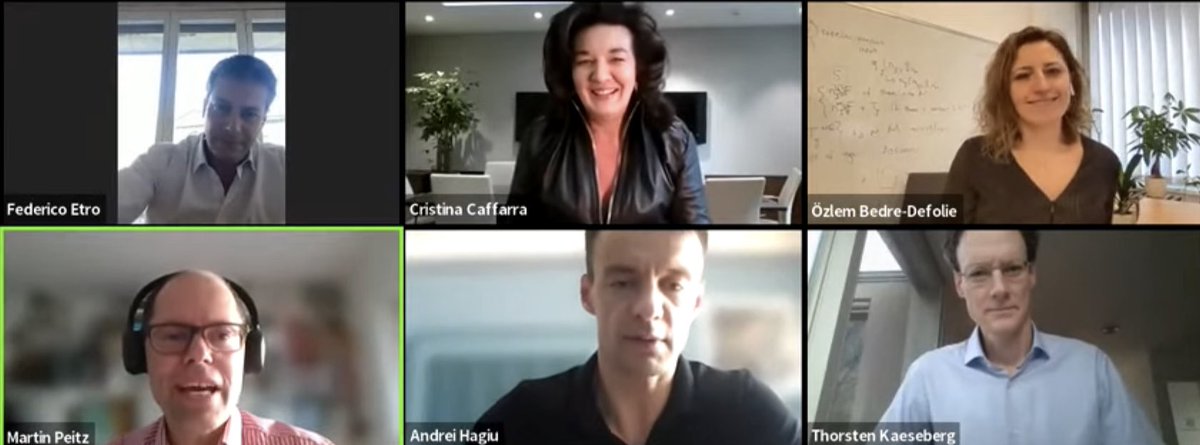Surfacing a few highlights from this @CEPR RPN discussion last week on #Ecosystem theories of harm in digital platform mergers. Worth watching in full, regulators in particular where🔥🔥🔥🧵
youtube.com/embed/dfs1D5Y0…
youtube.com/embed/dfs1D5Y0…
https://twitter.com/tomvalletti/status/1587048881879146499

@TomValletti table sets: “approach to conglomerate mergers too narrow: not the same market, no problem. Should they be allowed to become even bigger? Why don’t they build instead of buying? Market power grows w each acquisition bcs ecosystem insulates from competition” 2/ 

“But yes, of course the agencies need to prove anticompetitive effects w specific evidence, not just general theories” 3/ 

Exam questions from me:
“How do we factor in the broader set of assets a company accumulated over time, presence in multiple markets, size, financial resources, capitalization? Anxiety among regulators: don’t want to look back in 5 years and say how did we miss all that?” 4/
“How do we factor in the broader set of assets a company accumulated over time, presence in multiple markets, size, financial resources, capitalization? Anxiety among regulators: don’t want to look back in 5 years and say how did we miss all that?” 4/

“Ground rule is there needs to be a merger-specific concern, so cannot just worry abt size and power but need to show how an acquisition creates harm. Do we need to articulate a specific mechanism? Leveraging? Liability standards? Remedies?” 5/ 

Mike Walker Chief Economist @CMAgovUK: “My concern as enforcer is all about deals creating barriers to innovative/disruptive entry & raising rivals’ costs. Not a new issue, been around since applications barriers to entry, but much bigger now bcs it comes up in many more areas”6/ 

“Efficiency offenses are economically coherent. Short-run efficiencies often key to long-run theory of harm. V uncomfortable for regulators, but need to take dynamic competition seriously. If ecosystem mergers allow incumbent to limit path of future innovation, it’s bad news”7/ 

“Personally given I think entry to compete against large platforms’ core products is already extremely difficult, I am worried abt anything that makes that entry harder. So in some large ecosystem deals the bar should be set high esp. if they involve data advantages” 8/
@johnmarknewman @FTC “If you control lots of different levers, that gives you ability to create harm. Yes in practice we need a mechanism, a story to tell a judge. But we can’t articulate it perfectly in a pristine manner bcs it’s uncertain. We should focus on capabilities” 9/ 

“How many levers do you wield? It may not be the exercise of the power that counts. It's the power itself” 10/
@johnmarknewman “We're not going to have precise, pristine theories of exactly what's going to happen. But a set of “plus factors” may be useful: is target a market leader, network effects, data advantages, network bridging capabilities, is technology in flux at this point?” 11/ 

“Need to think of remedy from day 1, bcs it’s only worth deploying our scarce resources if a meaningful remedy can be had.
Those multiple leverage points, where regulators don't have good info abt which levers might be pulled, militate in favour of structural solutions” 12/
Those multiple leverage points, where regulators don't have good info abt which levers might be pulled, militate in favour of structural solutions” 12/

Hans Zenger @EU_Competition: “Most economic theories of dynamic foreclosure start w short-term benefits to consumers, followed by a very large negative. It’s our burden to prove in the end. But just bcs there's some small benefit early on, doesnt make it an efficiency offense”13/ 

“Much more abt dynamic forward-looking effects than old portfolio strength theories, denying entry points to rivals & creating impermeability of position across markets. It's a “foreclosure plus” standard: some foreclosure laced w potential competition, innovation, entry…” 14/ 

“Lens of capabilities is useful. Cant just say you have an advantage, too many efficiencies around, must show competitive harm. But standard shld be linked to expected cost: eg Nvida-ARM, getting it wrong cld mean messed-up situation for vast majority of chips in modern life” 15/
Hans Zenger, @EU_Competition “Then it's not only about the incentive, it's mostly about ability, and the higher the ability, that should factor into what an agency needs to show to discharge its burden of proof” 16/ 

Qualified support from academics on the panel 👇 17/
Patrick Rey @TSEinfo
“Need to rethink competition away from narrow approach (substitutes vs complements) to competition between ecosystems. Need to understand if merger of complements can pre-empt entry, or reduce incentive to support innovation of other complement providers” 18/
“Need to rethink competition away from narrow approach (substitutes vs complements) to competition between ecosystems. Need to understand if merger of complements can pre-empt entry, or reduce incentive to support innovation of other complement providers” 18/

“Do we need a “mechanism” or are “capabilities” enough? The more capability you have the more levers you have. But that will not eliminate the need for a story. The standard of proof may need to be adjusted though given what we know, maybe a precautionary principle” 19/
Feng Zhu @HarvardHBS “Network effects entry barriers vary a lot – is demand hit-driven or do consumers value variety? Multi homing or single homing, one side or both? Clustering structure? Disintermediation?If deal facilitates network bridging it can raise cost to compete 20/ 

@AnnabelleGawer “Strategic decisions not made at level of separate markets,unit of analysis is constellation of markets. Platform has governance role, decides scope of the firm, but also configuration of platform “sides” & design of digital interfaces connecting these actors”21/ 

“Merger doesnt just change scope of the firm, but also other two. Platforms start w narrow scope & open interfaces, aiming to add members to their sides, but then close or recalibrate interfaces while expanding scope. Bad for entry, making engagement of others more difficult” 22/ 

Overall: strong candid discussion that should be required listening/reading to all those lamenting “regulators no longer use economic logic, they’ve all gone mad”… end/
• • •
Missing some Tweet in this thread? You can try to
force a refresh












